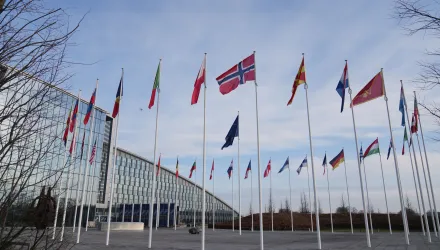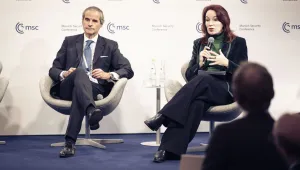Coming just days after investigations into the Brussels attacks rekindled fears of nuclear terrorism, this week’s fourth (and final) global Nuclear Security Summit should serve notice that, despite substantial progress in recent years, world leaders must redouble their work to protect nuclear material from terrorist groups like ISIS.
The Belfer Center’s team of nuclear experts – led by the Center’s Project on Managing the Atom – has helped lead the effort to study and strengthen nuclear security around the world. The Project’s latest report, “Preventing Nuclear Terrorism: Continuous Improvement or Dangerous Decline?,” calls attention to progress and remaining gaps in security as well as evolving threats. It concludes with six categories of recommendations to keep terrorists from realizing their nuclear designs. The report was featured in a page-one article in The New York Times yesterday.
What are center experts watching for at this week’s summit?
President Obama launched the Nuclear Security Summit initiative to address the threat of nuclear terrorism, which he rightly called “the single largest threat to American national security.” There can be no doubt that this initiative has stimulated many actions that make us safer: for example, the elimination of a half-dozen bombs’ worth of highly enriched uranium that had been left in Ukraine until 2012. But the ugly truth is that despite the fact that we have been running faster, so, too, have terrorists and those who are creating more fissile material in North Korea, Pakistan, India, and elsewhere. It is thus difficult to make a bottom-line judgment about whether risks have declined, or alternatively risen.
Graham Allison, Director, Belfer Center for Science and International Affairs
The nuclear security summits have led to substantial progress in improving nuclear security around the world. But dangerous weaknesses remain. This summit is the moment for world leaders to put the international community on a path of continual improvement in nuclear security, to prevent the Islamic State and terrorists like them from ever getting their hands on the ingredients of nuclear terror.
Matthew Bunn, Professor of Practice, Harvard Kennedy School
The summit will help determine the future role of the International Atomic Energy Agency (IAEA) in nuclear security. I will be watching whether the Action Plan for the IAEA recommends an expanded role; what new functions are proposed; and whether additional resources are pledged. Ideally the Agency will be encouraged to broaden the scope, depth, and diplomatic impact of its nuclear security conferences (the next one is in December this year), drawing on summit precedents. The Agency should also be enabled to expand its peer-review system, strengthen its nuclear security guidance and recommendations, and enhance its assistance to states.
Trevor Findlay, Associate, Project on Managing the Atom
Leaders at the Nuclear Security Summit will issue a set of “action plans” for future efforts—with the IAEA playing a central role. More important than plans will be actions. Will the next US president push the nuclear security agenda? Will Russia (which is not participating in the summit) and the United States rebuild their cooperation on securing their respective nuclear complexes and on helping others do the same? Will China, India, and Pakistan implement and build upon recommended measures to protect for their large and growing nuclear programs? In the face of what appears to be a very serious threat of nuclear terrorism and sabotage from the Islamic State, we need leaders to take action. The IAEA’s commitment to nuclear security is only as strong as governments make it.
Martin B. Malin, Executive Director, Project on Managing the Atom
The stakes have never been higher in terms of denying terrorists access to nuclear facilities, insiders, and nuclear-weapons-usable materials. In the light of a spate of recent terrorist attacks, increasing levels of terrorist violence, and the avowed interest of violent Islamic terrorist groups to acquire weapons of mass destruction, the success of this summit boils down to accomplishing one main task: devoting sufficient leadership attention and concrete commitments to deny ISIS and associated groups the prize they are seeking – the capability to pull off a nuclear terrorist attack.
Rolf Mowatt-Larssen, Senior Fellow, Belfer Center for Science and International Affairs
Since this is the last summit, it is essential that participants agree to action plans that will, in the absence of high-level political attention, sustain and strengthen nuclear security around the globe. These action plans should bolster existing international fora, encouraging better information sharing about best practices and emerging threats, commitment building, and technical assistance when needed. As has occurred in previous summits, states should also pledge to take concrete steps that will further strengthen their nuclear security.
Nickolas Roth, Research Associate, Project on Managing the Atom
President Obama can be proud that the Nuclear Security Summit process that he launched in 2010 has substantially improved the security of nuclear materials and facilities and reduced the risk of nuclear terrorism. However, the rise of Islamic State may pose an even greater threat than al-Qaeda. The central issue for the 2016 Nuclear Security Summit is how to continue progress on nuclear security in the absence of additional summits. Hopefully the enhanced Islamic State threat will provide the incentive for world leaders to keep focus.
Gary Samore, Executive Director for Research, Belfer Center for Science and International Affairs
The most important thing world leaders can do to advance nuclear security on an ongoing basis is to recognize their undelegatable responsibility for their country's nuclear security. This recognition would sustain nuclear security efforts beyond the final Summit.
William H. Tobey, Senior Fellow, Belfer Center for Science and International Affairs
I will pay attention to new commitments Chinese President Xi Jinping will bring to the final summit, in particular, on international cooperation. At the first summit in 2010, then President Hu Jintao and President Barack Obama initiated a joint project to build the Center of Excellence on Nuclear Security in Beijing, which was commissioned on March 18, 2016, a major achievement for China in advance of the 2016 Nuclear Security Summit. As those summits-driven projects are completed, I expect U.S.-China nuclear security cooperation to expand further. Finally, I am eager to see new national “gift baskets” – specific pledges that countries make to further advance nuclear security.
Hui Zhang, Senior Research Associate, Project on Managing the Atom



